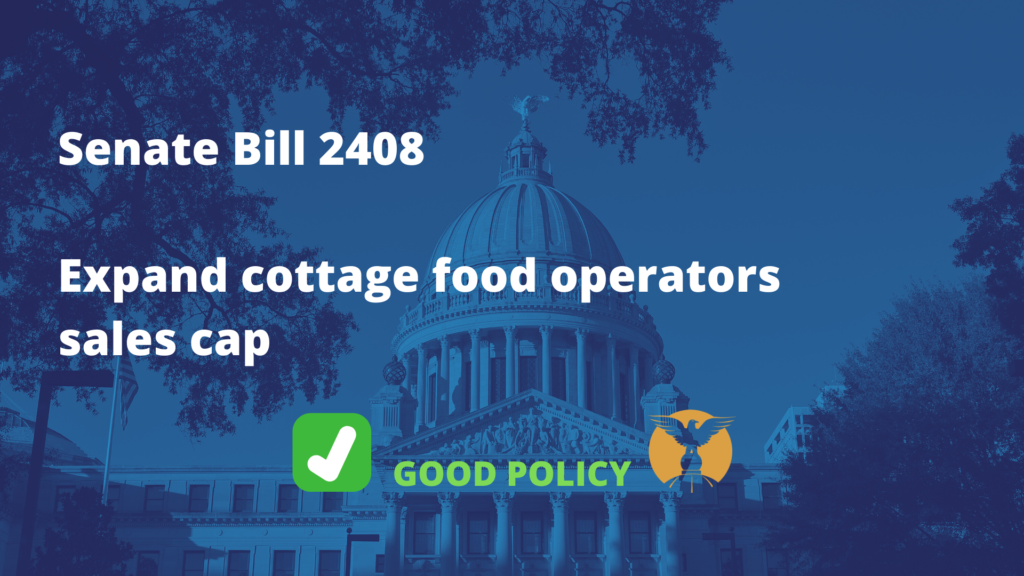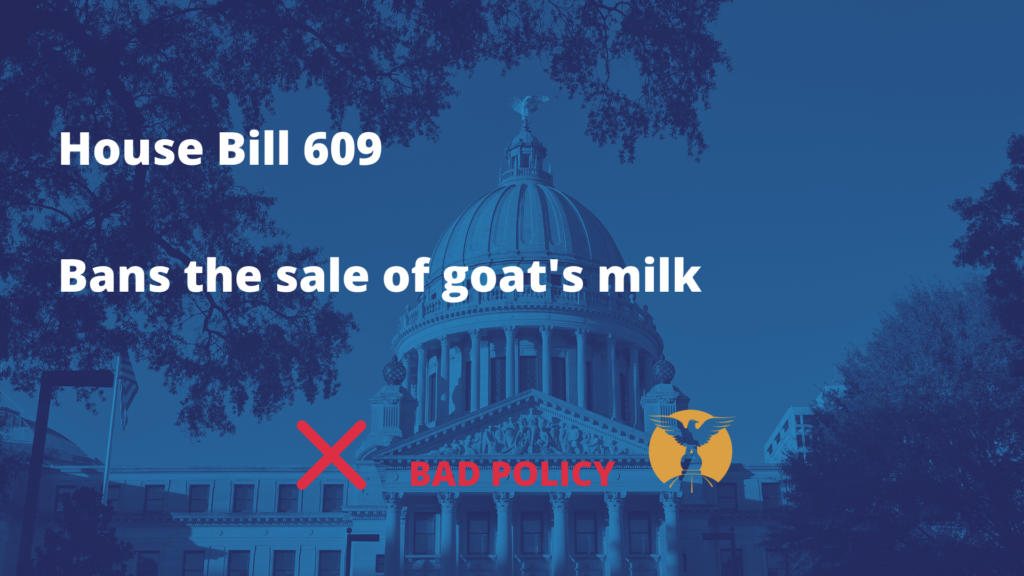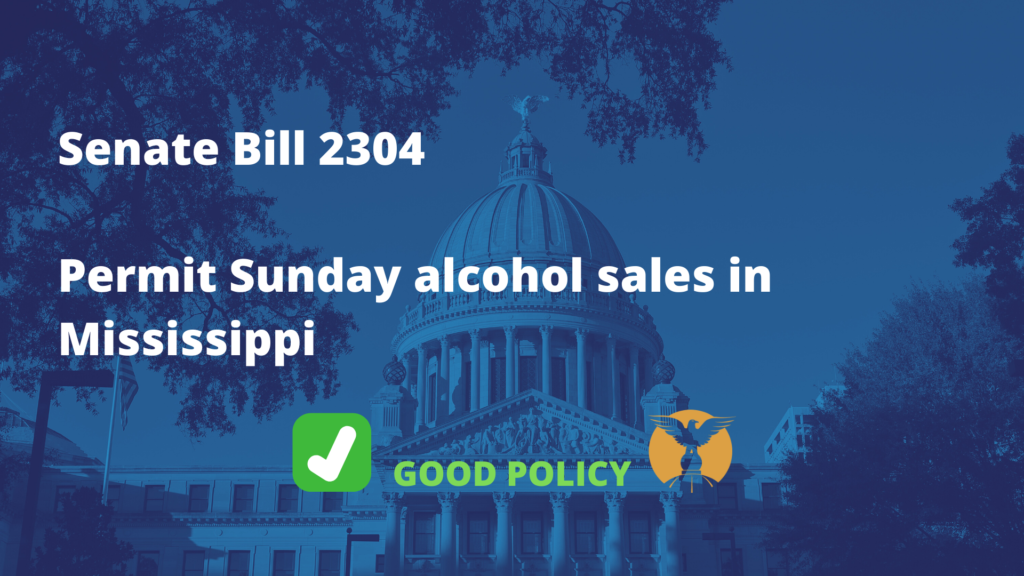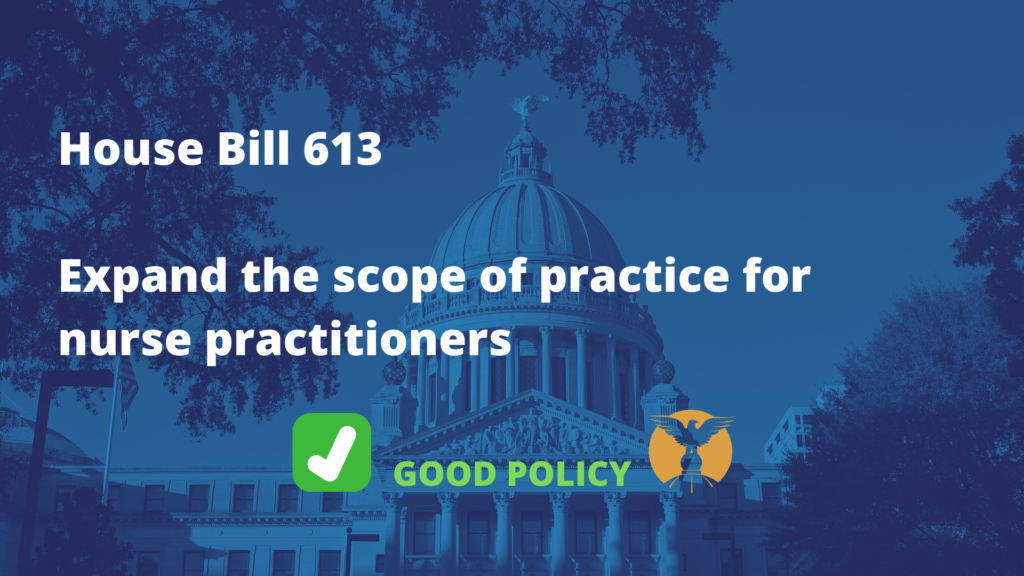Senate Bill 2408, sponsored by Sen. Melanie Sojourner, would raise the cap on annual sales for those in the cottage food industry to $50,000 and expressly permit operators to advertise on social media. A bill to raise the salary cap to $35,000 already passed the House.

Currently, cottage food operators are capped at $20,000. This is the third lowest cap in the country, and only serves to discourage an individual from earning additional income. Neighboring Arkansas and Tennessee have no cap.
Also, the Department of Health had interpreted vague language in the current law that restricts internet sales to mean an individual could not share pictures on social media. Soon, cottage food operators began to receive notices from the department. They have since said they’ve stopped that practice, but the uncertainty remains. This will clarify for cottage food operators that they can, indeed, share images of food they make on social media.
An identical bill passed the House last year, but died in the Senate without a vote.
There has not been evidence to suggest that lightly regulated states pose a threat to public health as some like to indicate. The limitations really just serve to limit competition for established businesses. By eliminating restrictions in Mississippi, we can give consumers new options, grow the economy, and encourage entrepreneurship.
MCPP has reviewed this legislation and finds that it is aligned with our principles and therefore should be supported.
Read SB 2408 here.
Track the status of this bill and all bills in our legislative tracker.
A bill banning the limited sale of goat milk that is moving through the state House is symbolic of the state’s larger resistance to food freedom.
Thirteen states allow the sale of raw milk in retail stores, ranging from states we generally associate with liberty like Arizona and Idaho, to states that are known for their regulatory burdens like California and Connecticut. Seventeen states allow sales of raw milk on the farm on which its produced. An additional eight states allow raw milk to be obtained through cow shares only.
Mississippi is part of the group of three states that only allow raw goat milk, but not raw cow milk. Bills to allow the sale of raw cow milk have regularly been introduced, but they've always been killed in committee without a vote.
This year, we appear headed in the opposite direction, with pending legislation restricting freedom, not expanding it.

Another bill pending in the legislature is a cottage food expansion. Currently, cottage food operators who have annual gross sales of less than $20,000 are given the freedom to sell goodies they bake in their own home, without the government inspecting their kitchen or providing a certificate. They are, however, prohibited from advertising those goodies online. The Department of Health has been known to send cease and desist letters to individuals posting pictures of their creations on Facebook and Instagram.
House Bill 326 will expand the cap to $35,000 and remove the internet prohibition. It has passed the House and is headed to the Senate. The same place it died last year. This would be a good start, but all a cap does is place a limitation on your ability to earn a living. Twenty-eight states, including neighboring Arkansas and Tennessee, have no cap.
Mississippi also maintains a prohibition on selling online to buyers within state limits and to selling through retail outlets like grocery stores.

Mississippi Department of Agriculture regulations prohibit all but direct farm-to-consumer sales by small-scale poultry producers. This is contrary to Mississippi law, which has adopted a federal exemption that allows small producers to sell to grocery stores, restaurants, hotels, hospitals, and other institutions.
In conformity with federal law, Mississippi law technically incorporates the federal 20,000 bird exemption, which allows poultry producers who raise fewer than 20,000 birds a calendar year to sell these birds without being subject to daily inspection and other facility requirements. MDAC regulations, however, do not recognize this mandated exemption in any meaningful way.
This means that Mississippi is forcing small poultry producers to follow federal requirements that were drafted with large-scale producers in mind. These requirements are onerous and expensive and address the unique problems created by large-scale poultry production. It is not appropriate to subject small producers to these requirements, which is why federal law has always allowed for a small producer (20,000 bird) exemption.
Unlike other states that recognize the federal 20,000 bird exemption, Mississippi prohibits all but direct farm-to-consumer sales for small farmers. This completely undermines the purpose of the exemption. Mississippi agricultural regulations ban small producers from selling to restaurants, grocery stores, hotels, schools and hospitals. As a result, small poultry producers are denied access to distribution channels currently open to large producers.

Mississippi has a regulatory problem that extends to various industries. All too often, the default response by lawmakers is to agree to protect the established interests rather than letting the market choose the winners and losers.
Perhaps 2020 will be different.
Mississippi needs to reform our regulatory and licensing burdens. Our current policies only serve to increase costs for business owners and consumers, while limiting choice for individuals and career opportunities for would-be entrepreneurs.
We have witnessed a push to make positive changes in states across the country, and even from Washington, D.C. In between dealing with the prison and Department of Human Services fallout and the normal fights over how to best spend taxpayer money, will we see regulatory reform come to Mississippi in 2020?
Gov. Tate Reeves has made red tape reduction a priority. During his State of the State, Reeves said, “We are assembling a team that is committed to ensuring that the people of Mississippi are never held back by cumbersome government. Regulations and processes that may have been well-intentioned, often serve only to slow our state down. We are going to fix that.”
That is welcomed news. Today, Mississippi has more than 117,000 regulations, which numerous empirical studies show to have a detrimental effect on economic growth. The state should begin to reign in these regulations by having each agency conduct an audit of their own administrative code. The truth is that many of these regulations are outdated, and the government doesn’t even know they exist. Thereafter, we should require two regulations be removed every time a new rule is authorized. Finally, we should implement a sunset provision, which would require the legislature to continuously monitor our administrative code and decide which regulations should stay and which should go.
Mississippi also licenses 66 low-and-middle income occupations. According to a recent report from the Institute for Justice, Mississippi has lost 13,000 jobs because of occupational licensing and the state has suffered an economic value loss of $37 million.
While they are a long way from becoming law, we have seen several bills introduced that would move the state in the direction toward economic freedom.
Last year, Arizona became the first state in the country to provide universal recognition for an occupational license an individual received in a different state. The idea was simple. Just because you cross state lines doesn’t mean you have forgotten how to practice your trade. House Bill 261, sponsored by Rep. Becky Currie (R-Brookhaven), would do the same thing, making Mississippi more welcoming to military families and new residents moving here, something the state sorely needs.
We’ve also seen steps to make it easier to work in various fields. The debate over expanded authority for nurse practitioners has been a longstanding fight in the legislature. House Bill 613, sponsored by Rep. Donnie Scoggin (R-Ellisville), would expand the scope of practice for nurse practitioners, exempting APRNs from the physician collaboration requirement after working for 3,600 hours. We need more healthcare professionals working in Mississippi, providing access in more parts of the state. This would help alleviate some of our doctor shortages.
Bills have also been introduced in the House and Senate to exempt eyebrow threaders from Board of Cosmetology regulations. Senate Bill 2127, sponsored by Sen. Angela Hill (R-Picayune), and House Bill 527, sponsored by Rep. Steve Hopkins (R-Southaven), would allow eyebrow threaders to practice their skill without having to spend 600 hours on an education that does not spend one hour on eyebrow threading. This is a small field and even though it’s growing, it won’t impact many people. Still, the current laws are symbolic of our reliance on government regulations that don’t serve a public benefit.
Regulations concerning those who use their kitchen to make and sell goodies may also be eased. House Bill 326, sponsored by Rep. Casey Eure (R-Saucier), would expand the sales cap for those in the cottage food industry to $35,000 and expressly permit operators to advertise on social media. The current limit is just $20,000, and the Department of Health had previously sent cease and desist letters to those who posted pictures of the food they are selling on Facebook or Instagram.
And Senate Bill 2196, sponsored by Sen. Kevin Blackwell (R-Southaven), would clarify that minors can run occasional businesses – such as lemonade stands – without a permit or license. This is a response to numerous localities across the country shutting down lemonade stands due to lack of permit. In a year when much of our focus is on workforce development, I can’t think of anything better for the future than teaching kids how to run a business and become an entrepreneur.
The legislature has much on their plate this year, as they do every session. These bills, and others like them, won’t generate a ton of headlines and will probably receive blowback from government regulators and those who have already played the regulatory game. But they represent the mentality the state needs to move toward for a stronger economy and less dependency on government.
This column appeared in the Madison County Journal on February 13, 2020.
House Bill 609, sponsored by Rep. Bill Pigott, would outlaw the sale of goat’s milk in the state. Those who violate the law could be sentenced to 60 days in jail and pay fines up to $500.

According to state law, the state allows the sale of goat’s milk if:
- The milk is sold directly to the consumer on the production premises.
- Nine or fewer producing goats are located at the farm where the milk is sold.
- The seller can’t advertise the milk for sale.
The law also has cleanliness requirements for the milking area, including sterile containers enforced by the state Department of Health. This bill would strike the sections governing the sale of goat’s milk from the law. The current law has a repealer on it, meaning it expires at the end of the fiscal year on June 30 if action is not taken first.
Mississippi provides limited access to raw milk for consumers. The state does not allow raw milk to be sold in stores, nor can raw cow’s milk be sold for human consumption. The state currently allows on-farm sales of goat’s milk only.
According to the U.S. Department of Agriculture’s Census of Agriculture, dairy goat herds expanded faster than any major livestock group from 2007 to 2017.
Individuals should have the freedom to purchase the milk they choose, free of government intrusion. We should be expanding access of raw milk to those who choose it, not outlawing it altogether.
MCPP has reviewed this legislation and finds that it violates our principles and therefore should be opposed.
Read HB 609.
Track the status of this and all bills in our legislative tracker.
House Bill 188, sponsored by Rep. John Hines, would mandate curriculum that homeschoolers in the state must teach.

Currently, homeschoolers have a great deal of education freedom with respect to curriculum, schedule, school hours, and reporting requirements. This bill would change that.
Under this proposal, the same Mississippi History and U.S. Government courses that government schools must teach would also be required of homeschool families and private schools.
Specifically, the proposal says, “The Mississippi History course must provide students with an examination of the history of the State of Mississippi from the age of discovery and colonization to the present with particular emphasis on the significant political, social, economic and cultural issues of the nineteenth and twentieth centuries which have impacted the diverse ethnic and racial populations of the state. All private, parochial and home-based school programs shall provide the same curriculum requirements to students enrolled in Grades 9 though 12.”
This would give the state authority to dictate what parents teach their children and how they teach it. Those rights belong with the parents who choose to homeschool, who generally make that choice because they want to set the curriculum that’s appropriate for their children free of state mandates.
Whether or not homeschool families in Mississippi teach Mississippi history or government – and we know most do – that is the choice of the parents, not the state.
MCPP has reviewed this legislation and finds that it violates our principles and therefore must be opposed.
Read HB 188.
Track the status of this and all bills in our legislative tracker.
Gaming is in good shape in Mississippi, as revenues are up for casino gaming by 3.32 percent in 2019 and the newly-formed lottery has an ambitious goal of paying back its borrowed seed money by the end of the fiscal year.
Officials from both the Mississippi Gaming Commission and the Mississippi Lottery Corporation briefed Mississippi House’s Gaming Commission at a hearing Tuesday.
Allen Godfrey, the executive director of the Gaming Commission, told the committee that while statewide gaming revenues are down from a high in 2007 of nearly $3 billion, the numbers improved slightly in 2019. Casinos earned $2.2 billion in revenue, up from nearly $2.13 billion in 2018.
The commission divides the state’s casinos into three regions: Tunica (northwest Mississippi), Lower River Region (Greenville, Vicksburg and Natchez) and the Coastal Region.
While revenues for the river cities increased from $293 million in 2018 to $304 million in 2019 and improved from $1.24 billion on the coast in 2018 to $1.31 billion in 2019, revenues from the Tunica casinos declined from $592 million in 2018 to $582 million in 2019.
Most recently, Penn National Gaming closed the Resorts Casino Tunica on June 30 as the number of casinos in Tunica shrank from nine to six.
The gaming commission regulates more casinos (26) with a smaller staff (110 full-time employees) and a smaller budget ($9.2 million) than Louisiana (20 casinos, 178 employees), Indiana (13 casinos, 218 employees) and Pennsylvania (16 casinos, 305 employees).
Since 2010, the numbers of casinos has declined from 30 to 26 and the workforce declined from 24,000 employees to 19,000.
As for the lottery, corporation president Thomas Shaheen said that the lottery was able to start earlier than its planned December launch of scratch-off tickets and has a goal of paying off its starter loan of $15 million by the end of the fiscal year on June 30.
He also said the lottery has generated sales of $12.4 million for the week that ended on February 8, with $10.9 million of that coming from scratch-off tickets. Despite only being on sale for a couple of weeks, Mega Millions ($672,677) and Powerball ($818,468) are already off a strong start.
Year to date, the lottery has generated $112 million in sales.
Shaheen said that the sales of the two will increase considerably when there are large jackpots at stake. He also said lottery tickets are for sale in all but one of the state’s 82 counties, but the lone holdout, Issaquena County, has a retailer application going through the background checks required before approval.
The lottery was authorized by an amendment to the state’s constitution in 1994, but it took until the 2018 special session of the legislature for the legislation to make it to the governor’s desk for signature.
It is supposed to provide the first $80 million in revenues for the State Highway Fund, with the excess going to the Education Enhancement Fund. Retailers will receive a six percent commission.
The gaming briefing was supposed to be a joint hearing with the Senate Gaming Committee, but debate on a controversial bill in the Senate kept the Senate members from attending.
That bill, Senate Bill 2257, would allow the State Auditor’s Office to examine tax returns of those receiving welfare benefits. It passed the Senate as amended with a two-year repealer that would force the legislature to take another look at it in two years before it expires.
The House has a similar bill that has yet to pass out of committee.
We are often tasked with criticizing government leaders and their actions due to overreach of their constitutional authority, but we recognize that occasionally legislation does in fact take tangible steps to attempt to expand, rather than limit our freedoms, and when that happens it ought to be noted.
We already have a few bills proposed by a range of legislators, who, at least on the issue of alcohol policy, seem to be attempting an expansion of personal freedom rather than a detriment.
Three bills that have emerged in the Mississippi House and Senate deserve just such credit and attempt to offer a decisive empowerment of consumer market freedom, specifically in regards to alcohol policy. Senate Bill 2304, introduced by Sen. Philip Moran, would allow for wine and liquor to be sold by stores on Sundays. House Bill 4, introduced by Rep. Brent Powell, would increase the number of liquor store permits an individual could own from one to three. Senate Bill 2031, introduced by Sen. Robert Jackson, would reduce the tax for package retailers’ permits in specific locations.
These bills are less about access to alcohol than they are about recognizing how government has intentionally suppressed a specific market, crushing the potentially large economic impact of a major industry. We wouldn’t allow the state to take similar actions regarding other businesses, so why do we turn a blind eye to the state’s strong handing of liquor and wine stores?
The question must be asked of those political defenders of prohibition-era policies: where does the line get drawn? If stifling the sale of alcohol is inherently good, then why not ban all liquor and wine sales in the state, or shut down distilleries, or limit the hours of operation so severely that stores are forced to close?
There is no philosophically consistent line by which one can defend both the free market and that an entrepreneur seeking to expand his business cannot own more than one liquor store.
Much more reform is needed before we can truly consider ourselves a state that values freedom, especially when it comes to alcohol policy. Alcohol can’t be delivered by Door Dash, Grub Hub, Postmates, or other apps, shipped to you online, sold to you before 10am or after 10pm, made by you to share with a friend, or brought in any amount by you from out of state. There’s clearly a long way to go.
However, these bills and others present a commitment to expanding freedom in the state, just as every bill should.
Senate Bill 2304, sponsored by Sen. Philip Moran, would allow for the Sunday sale of alcohol in Mississippi.

Current Mississippi law prohibits liquor stores, the only stores that sell liquor or wine, from being open on Sunday, or Christmas Day. The Christmas Day prohibition and the 10 a.m. to 10 p.m. hours of sale would remain. The current laws interfere with a business owners’ ability to run their own business, while limiting consumer choices.
This, however, is just one small part of the state’s desire to regulate, and in many cases, prohibit, legal alcohol sales in the state.
While the internet, technological developments, and more have made the purchase and production of alcohol freer and easier in other states, Mississippi has denied its citizens personal liberty on this issue.
The state has discouraged craft beer production, overregulated alcohol distribution, and cracked down on the ability for citizens to privately produce alcohol. Permits are difficult to secure, and thus many businesses have been left in the dark, unable to expand or operate.
Mississippi could make considerable strides by entrusting in its citizens a greater personal responsibility and freedom when it comes to alcohol sale and production.
There is much the state could do, but this is a step in the right direction.
MCPP has reviewed this legislation and finds that it is aligned with our principles and therefore should be supported.
Read SB 2304.
Track the status of this and all bills in our legislative tracker.
House Bill 613, sponsored by Rep. Donnie Scoggin, will allow nurse practitioners to expand their scope of practice.

Currently, nurse practitioners are required to practice in a collaboration with a physician. This would exempt them from this requirement after working for 3,600 hours.
Mississippi limits the ability of nurse practitioners to practice up to their full training — what is called “full practice authority.” In particular, nurse practitioners who wish to open their own practice, or a free-standing clinic, must enter into a collaborative agreement with a physician. This agreement requires the supervising physician to be within a 75-mile radius of the nurse’s practice location. The supervising physician is then required to randomly review up to 20 of the nurse practitioner’s patient charts and meet with the nurse practitioner once every quarter. The typical charge for this minimal (not real time) standard of review is $74 a day or $2,250 a month.
Numerous studies demonstrate that nurse practitioners provide care that is at least as good as physicians, with some studies showing even better outcomes. In part, this may be because nurse practitioners are both less expensive and more accessible, especially for rural and low-income patients. Other evidence suggests that nurse practitioners tend to follow recommended guidelines more frequently and, also, spend more time with patients — practices associated with better patient outcomes.
That is why 24 states and the District of Columbia extend full practice authority to nurse practitioners, which means nurse practitioners can independently evaluate and treat patients.
Just as Certificate of Need laws are being used to protect hospital monopolies, professional licensing and scope-of-practice regulations are being used to protect individual provider monopolies.
MCPP has reviewed this legislation and finds that it is aligned with our principles and therefore should be supported.
Read HB 613.
Track the status of this and all bills in our legislative tracker.

